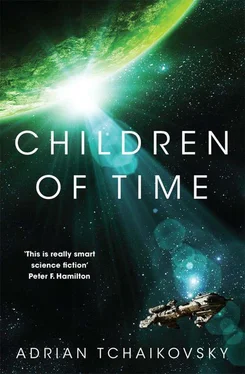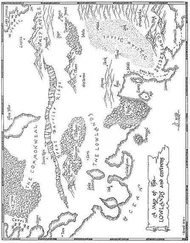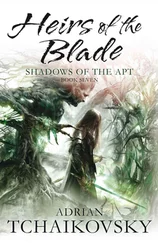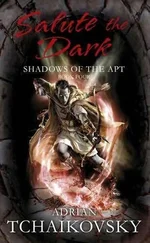It had not escaped their notice that creatures formed like the giants – mice and similar vertebrates seeded across their world – did not carry the nanovirus, and so lacked a commonality that seemed to bind the spiders to each other and to other arthropod species. Mice were just animals. There seemed no possibility of them ever becoming anything else. Compared to them, the Paussid beetles – or a dozen other similar creatures – were practically bursting with potential.
The spiders have worked long and hard to craft and breed a variant of the nanovirus that attacks mammalian neurology – not the full virus in all its complexity but a simple, single-purpose tool that is virulent, transmissible, inheritable and irreversible. Those parts of the nanovirus that would bolster evolution have been stripped out – too complex and too little understood – leaving only one of the virus’s base functions intact. It is a pandemic of the mind, tweaked and mutated to rewrite certain very specific parts of the mammal brain.
The very first effect of the nanovirus, when it touched the ancient Portia labiata spiders so many thousands of generations ago, was to turn a species of solitary hunters into a society. Like calls out to like, and those touched by the virus knew their comrades even when they did not have enough cognitive capacity to know themselves.
Kern – and all the rest – watches the shuttle land. Up on the Gilgamesh , orbiting a hundred kilometres beyond the equatorial web and its space elevators, there are many humans, all infected, and thousands still sleeping who will need to have the virus introduced to them. That task will take a long time, but then this landing is the first step towards integration, and that will also take a long time.
Even within the spiders, the nanovirus has fought a long battle against ingrained habits of cannibalism and spouse-slaying. Its notable success has been mostly within-species, though. Portiids have always been hunters, and so pan-specific empathy would have crippled them. This was the true test of their biochemical ingenuity. The spiders have done their best, conducting what tests they can on lesser mammals, but only after Portia and her peers had taken control of the ark ship and its crew could the truth be known.
The task was not just to take a cut-down version of the virus and reconfigure it so as to attack a mammal brain: difficult enough on its own, but essentially useless. The real difficulty for that legion of spider scientists, working over generations and each inheriting the undiluted learning of the last, was to engineer the human infection to know its parents: to recognize the presence of itself in its arachnid creators, and call out to that similarity. Kinship at the submicrobial level, so that one of the Gilgamesh ’s great giants, the awesome, careless creator-gods of prehistory, might look upon Portia and her kin and know them as their children.
Once the shuttle has landed, the spiders press closer, a seething, hairy greyish tide of legs and fangs and staring, lidless eyes. Kern watches the hatch open, and the first humans appear.
There is a handful of them only. This is, in itself, an experiment simply to see if the nanovirus fragment has produced the desired effect.
They step down among the tide of spiders, whose hard, bristly bodies bump against them. There is no evident revulsion, no sudden panic. The humans, to Kern’s reconfigured eyes, seem entirely at ease. One even puts her hand out, letting it brush across the thronging backs. The virus in them is telling them all, This is us; they are like us . It tells the spiders the same, that crippled fragment of virus calling out to its more complete cousins: We are like you.
And Kern guesses, then, that the spiders’ meddling might go further than they had thought. If there had been some tiny bead present in the brain of all humans, that had told each other, They are like you ; that had drawn some thin silk thread of empathy, person to person, in a planet-wide net – what might then have happened? Would there have been the same wars, massacres, persecutions and crusades?
Probably , thinks Kern sourly. She wants to discuss it with Fabian, but even her faithful acolyte has crept out into the sunlight to watch this first-hand.
At the shuttle’s hatch, Portia steps out after the humans, along with some of her peer group. The enormity of what she has played a part in is mostly lost on her. She is glad to be alive: many of her fellows are not so lucky. The cost of bringing the human race around to their point of view has been high.
But worth it , Bianca had assured her, when she aired that thought. After this day, who knows what we may accomplish
together? They are responsible for our being here, after all. We are their children, though until now they did not know us.
Amongst the humans is one who Portia had thought was injured or ill, but now understands to be simply at the end of her long giant’s life. Another, a male, has carried her from the shuttle and laid her on the ground, with the spiders forming a curious, jostling but respectful circle around them. Portia sees the ailing human’s hands clench at the ground, gripping the grass. She stares up at the blue sky with those strange, narrow eyes – but eyes in which Portia can find a commonality, now that the bond of the nanovirus runs both ways.
She is dying, the old human – the oldest human there ever was, if Kern has translated that correctly. But she is dying on a world that will become her people’s world: that her people will share with its other people. Portia cannot be sure, but she thinks this old human is content with that.
Helena Holsten Lain reclines in her webbing, feeling at ease in the zero gravity, whilst around her the rest of the crew complete their pre-launch checks.
The ship has two names and they both mean the same thing: Voyager . Helena does not know that this was once, in a long-ago age, the name for a pioneering human space vehicle, one that might, millennia after its launch, still be speeding through the cosmos somewhere, a silent record of achievement long forgotten by its makers’ descendants.
There is nothing of the long-dismantled Gilgamesh in the Voyager , save the ideas. The old technology of Earth, so painstakingly husbanded by Helena’s great-great-grandmother, has been resurrected, rediscovered, built upon and advanced. The scientists amongst the spiders first learned what the humans could teach, about their technology of metal and electricity, computers and fusion drives. After that, they taught it back to their tutors’ children, broadened and enhanced by a non-human perspective. In the same way, human minds have unravelled the threads of the spiders’ own complex biotechnology and offered their insights. Both species have limits they cannot easily cross: mental, physical, sensory. That is why they need each other.
The Voyager is a living thing with a fusion-reactor heart, a vast piece of bioengineering with a programmable nervous system and a symbiotic ant colony that regulates, repairs and improves it. It carries a crew of seventy, and the stored genetic material of tens of thousands of others, and hundreds of thousands of Understandings. This is a vessel of exploration, not a desperate ark ship, but the journey will last many sleeping years, and the precautions seemed wise.
The two peoples of the green world work together in easy harmony now. There was a generation of wary caution on both sides, but once the nanovirus had taken down those barriers – between species and between individuals – so much potential tragedy was already averted. Life is not perfect, individuals will always be flawed, but empathy – the sheer inability to see those around them as anything other than people too – conquers all, in the end.
Читать дальше












